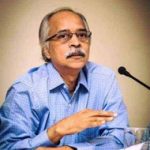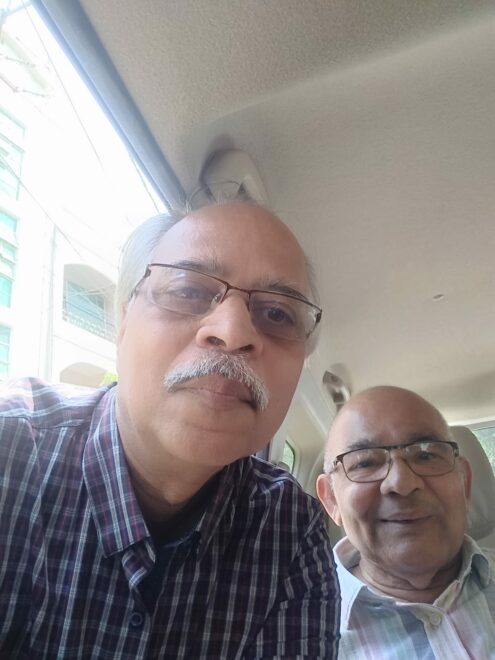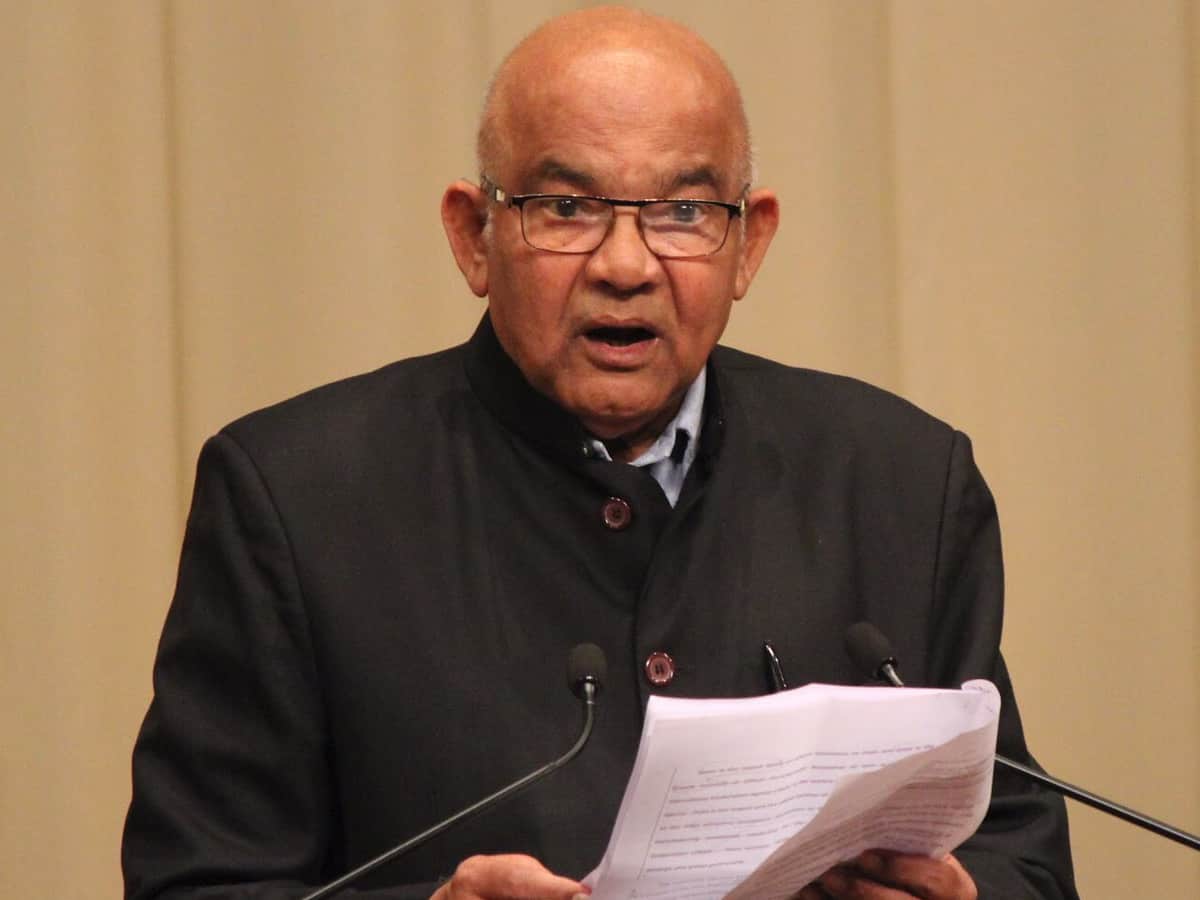
Hyderabad: In March, 2020, I managed this memorable selfie with Dr Yaga Venugopal Reddy, one of the bureaucrats with a ‘Steel frame’ and a banker-economist with a vision.
It was like the typical Journalist trying to ‘Buttonhole’ (grab an opportunity) a chance meeting into a story. But, the picture went wrong with me getting more unwanted face space and focus than Dr Reddy. It was basically because of my amateur click and very fleeting time.
The rendezvous was right on the street in Vijaynagar Colony (Hyderabad) and the occasion was not a happy one as we were there to pay our respects and condolences to Mr Pothuri Venkateswara Rao, one of the giants of Telugu Journalism and an Author. In under 5 minutes, I greeted, enquired about him and managed to take the picture with Dr Reddy, who normally is ‘shy of media attention’. I could not strike much of a conversation as the scare of COVID-19 had just started spreading in Hyderabad.
A quintessential bureaucrat
Dr Reddy, who completed 80 today, has played key roles in the 1991 Economic Crisis and Liberalisation, averting a major economic crisis in 2008, with his steadfast policies as RBI Governor during 2003-08, and contributed a lot to Financial Inclusion and development as a career bureaucrat and banker in the last 50 years.
As a young collector of Karimnagar district, the 1964 batch IAS officer of the Andhra Pradesh cadre was associated with the ‘Karimnagar Project’ of 1971-72. The State Chief Minister then was P V Narasimha Rao. It was the first initiative that aimed to deploy Science and Technology for the integrated development of a district in India.
The project was conceived by Dr Y Nayudamma, the Scientific Adviser to Prime Minister, Indira Gandhi. It was coordinated by Dr S Hari Narain, Director, National Geophysical Research Institute (NGRI), Hyderabad. Technologies developed by India’s national laboratories in science, agriculture, space etc. were targeted to ensure an integrated development of rural area.
Dr Reddy recalled his association with the project and inspiration from Dr Nayudamma at the 18th Dr Y Nayudamma Memorial Award in Tenali in 2009. As the Chief Guest, he presented the award to Dr V K Saraswat, the Scientific Advisor to Defence Minister and Director General, Defence Research and Development Organisation.
I had the privilege of spending a few hours at the evening reception in Tenali in the company of Dr Reddy, Dr Saraswat, Dr D L N Prasad, a noted Plastic Surgeon and a select few organised by the late P Vishnumurthy, the Founder of the Dr Y Nayudamma Trust, who held the event for nearly 25 years in a row. Dr Reddy’s insights and sparkling sense of humour were dominant as were the anecdotes shared by Dr Saraswat about India’s Missile achievements.
It is interesting to note that Dr Reddy who is normally reluctant to take part in public events revealed that it was Dr Nayudamma’s (incidentally, Nayudamma hailed from Tenali) commitment and vision for application of India’s S&T to rural development, which he saw during the Karimnagar Pilot project, which attracted him and he decided to come to the Tenali event.
The visionary banker
Having joined the IAS in 1964, Dr Reddy served the Government of Andhra Pradesh in various positions, right through the Chief Ministers-K Brahmananda Reddy, P V Narasimha Rao, Jalagam Vengal Rao, Dr M Channa Reddy and N T Rama Rao before moving to the Union Government, where he played an important role in the 1991 ‘Balance of Payments’ crisis, that finally was averted by the interventions of Prime Minister P V Narasimha Rao, his Finance Minister, Dr Manmohan Singh and a large team of committed economists, bureaucrats and opposition leaders like A B Vajpayee.
Recounting his experience of the crisis, Dr Reddy states that ‘political weakness and inaction were key triggers of the crisis. The country was vulnerable because there was no proper political leadership. This is reflected in the fact that during 1990-93, India had three prime ministers, three finance secretaries, and three chief economic advisors.
Through his dint of hard work and commitment Dr Reddy moved up to rise to the position of Secretary (Banking) in Ministry of Finance in 1995. He moved to RBI in 1996 as Deputy Governor, and then to International Monetary Fund in 2002 as Executive Director. He was made the 21st Governor of the apex bank in 2003, succeeding Dr Bimal Jalan.
A conservative in his approach to decision making, Dr Reddy brought in his experience as an Administrator dealing with political leadership and insights into global banking trends to face tough challenges during his tenure. It was common knowledge that he had a tenuous relationship with the Finance Minister, P Chidambaram but good rapport with the Prime Minister, Dr Manmohan Singh. There were also heavyweights like Dr Montek Singh Ahluwalia, Dy Chairman, Planning Commission and Dr C Rangarajan as Chairman of important economic committees to deal with.
It was indeed this acumen and dexterity that ensured his handling of the 2007-08 global financial crisis and holding the economy in good condition, which won accolades from global experts too. Dr Reddy in all humility acknowledges the excellent leadership team and the ‘Conservative agenda’ that he was allowed to pursue as the key factors that helped India withstand the crisis.
Post, his illustrious role at the helm of the RBI, Dr Reddy returned to the Academia. He was with the University of Hyderabad and was also closely associated with the IIT, Madras and the Columbia University. He played an important role as a member of the UN Commission of Experts on Reforms of the International Monetary and Financial System
However, his services were again utilised by the Union Government in 2013, when he was appointed the Chairman of the 14th Finance Commission. He took the bold decision of upwardly revising the devolution of share of states in central taxes to 42 percent, the single largest ever recommended, which was accepted.
Referring to the troubles and loss of trust the banking sector is undergoing, Dr Reddy identified 6 reasons: Mounting NPAs (Non performing assets), Inadequate capital to make up for the NPAs in discharging the liabilities; Making depositors share the loss through a proposed law; The large criminal frauds in certain banks; The investigations launched and raids conducted on some Board Members and CEOs and RBIs simultaneous actions possibly causing some disruption in some quarters.
Financial Inclusion and Author
Dr Reddy has penned several books too in the long career with the popular, autobiographical work, Advice & Dissent—My life in Public Service, where he has recollected many of his interesting and challenging experiences over a long career. He has been honoured with the Padma Vibhushan.
Dr Reddy hails from Kadapa. He did his Master’s in Economics from Madras University and obtained a doctorate from Osmania University, Hyderabad. He was proud of his doctorate from Osmania University when most would take pride in mentioning doctorates from foreign universities. The Osmania University too proudly cites him among the illustrious alumni.
His strong grounding in rural realities and concerns for the underprivileged sections reflected in his espousing their cause through the concept of Financial Inclusion, which he popularised in his annual policy statement as Governor in 2005.
Financial Inclusion has since gained currency not just in India but globally. He succeeded in convincing banks to include vast sections of the population into their scheme of things. It’s gratifying that this push has over the past 15 years led to large percentage of underprivileged Indians getting included in banking schemes and those devised by the Union and various State governments.
He always believed that devolution of powers to local bodies will be effective when they have the ability to raise resources and spend for the fulfilment of local needs, says Dr B Yerram Raju, banker and former Dean of Studies at the Administrative Staff College of India, Hyderabad.
With age Dr Reddy has slowed down, but for a rare reaction to ongoing economic challenges facing the country. In the recent, virtual lecture at Manthan, the public forum based in Hyderabad in July, Dr Reddy shared his views on a wide range of issues including the Indian federal structure, changing landscape and new challenges.
On the crucial Union-State relations, Dr Reddy felt that a sort of re-balancing was going on. Delving on it, he struck a note of caution, “We should not underestimate the strong sub-national sentiments along with the loyalty to the country. We also need to recognise the enhanced expertise in the administration along with the integration of the economy and society in the past two decades as we march ahead.”

Somasekhar Mulugu, former Associate Editor & Chief of Bureau of The Hindu BusinessLine, is a well-known political, business and science writer and analyst based in Hyderabad

